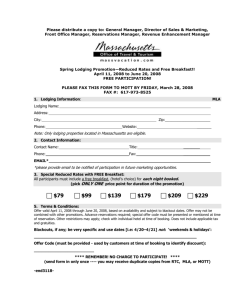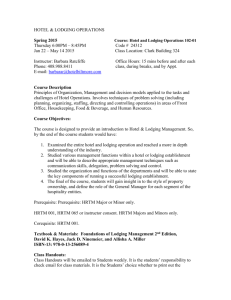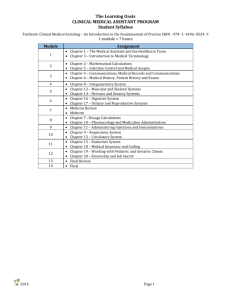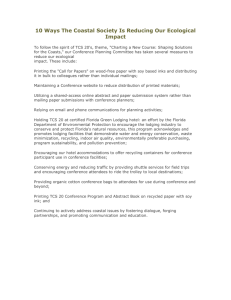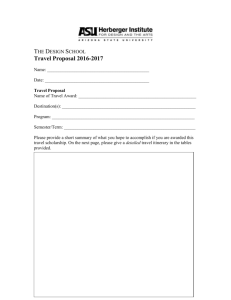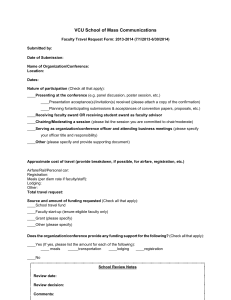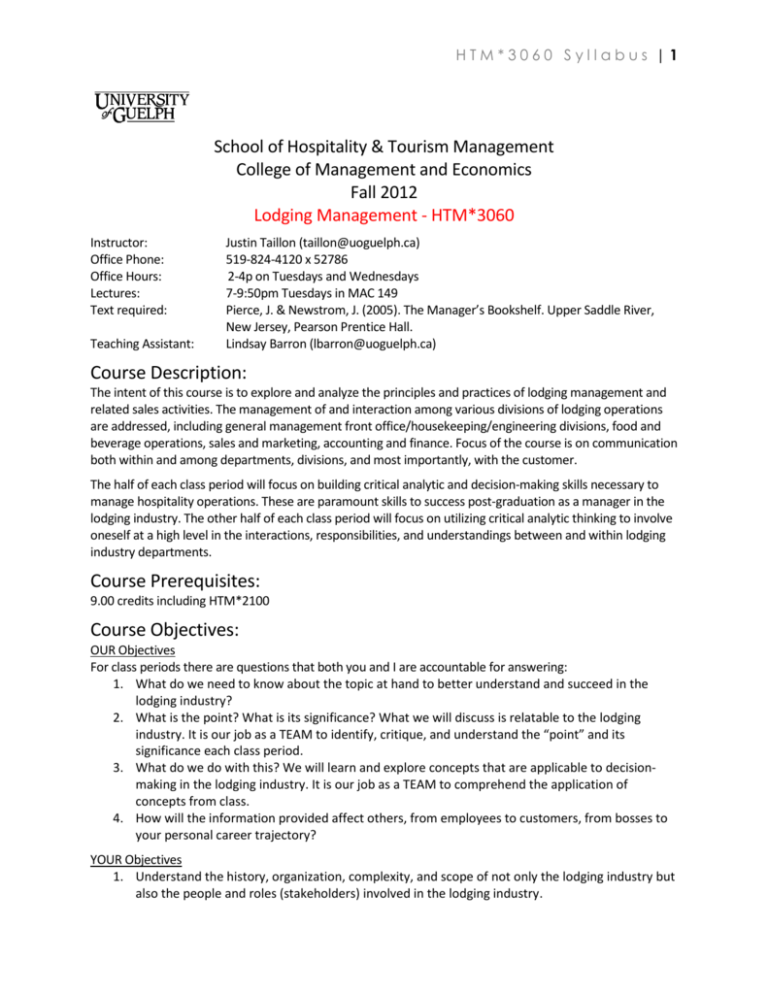
HTM*3060 Syllabus |1
School of Hospitality & Tourism Management
College of Management and Economics
Fall 2012
Lodging Management - HTM*3060
Instructor:
Office Phone:
Office Hours:
Lectures:
Text required:
Teaching Assistant:
Justin Taillon (taillon@uoguelph.ca)
519-824-4120 x 52786
2-4p on Tuesdays and Wednesdays
7-9:50pm Tuesdays in MAC 149
Pierce, J. & Newstrom, J. (2005). The Manager’s Bookshelf. Upper Saddle River,
New Jersey, Pearson Prentice Hall.
Lindsay Barron (lbarron@uoguelph.ca)
Course Description:
The intent of this course is to explore and analyze the principles and practices of lodging management and
related sales activities. The management of and interaction among various divisions of lodging operations
are addressed, including general management front office/housekeeping/engineering divisions, food and
beverage operations, sales and marketing, accounting and finance. Focus of the course is on communication
both within and among departments, divisions, and most importantly, with the customer.
The half of each class period will focus on building critical analytic and decision-making skills necessary to
manage hospitality operations. These are paramount skills to success post-graduation as a manager in the
lodging industry. The other half of each class period will focus on utilizing critical analytic thinking to involve
oneself at a high level in the interactions, responsibilities, and understandings between and within lodging
industry departments.
Course Prerequisites:
9.00 credits including HTM*2100
Course Objectives:
OUR Objectives
For class periods there are questions that both you and I are accountable for answering:
1. What do we need to know about the topic at hand to better understand and succeed in the
lodging industry?
2. What is the point? What is its significance? What we will discuss is relatable to the lodging
industry. It is our job as a TEAM to identify, critique, and understand the “point” and its
significance each class period.
3. What do we do with this? We will learn and explore concepts that are applicable to decisionmaking in the lodging industry. It is our job as a TEAM to comprehend the application of
concepts from class.
4. How will the information provided affect others, from employees to customers, from bosses to
your personal career trajectory?
YOUR Objectives
1. Understand the history, organization, complexity, and scope of not only the lodging industry but
also the people and roles (stakeholders) involved in the lodging industry.
HTM*3060 Syllabus |2
2. Speak and write using terminology appropriate to the lodging industry.
3. Understand the roles of professional associations, government agencies, trade and professional
literature, and organizations.
4. Understand different types of lodging industry establishments.
5. Understand approaches to problem-solving and be able to apply these concepts.
6. Understand motivations in the Lodging Industry for different levels of stakeholders.
7. Understand the various career directions within the Lodging Industry.
8. Most importantly, we must all be able to apply the successful managers’ philosophy: “You are
the only reason for everything that happens to you” throughout the entire semester.
INSTRUCTOR Objectives
I am responsible for providing you with the tools and capabilities to complete assignments and answer the
aforementioned questions. Furthermore, I am accountable for the following:
Making students feel welcome and invited in the classroom.
“Coaching” to promote success in the classroom.
Being empathetic to your needs.
Being enthusiastic about the material being covered.
Completing tasks in a timely manner.
If you are failing to meet your goals during the semester I will not hesitate to let you know. If I fail to meet
my goals during the semester please do not hesitate to let me know.
Participation
Participation in the classroom is necessary for learning to occur in this class. Therefore, you are expected to
participate for this course. If you fail to participate I will assume you are not prepared. If you are consistently
not prepared I will request an additional meeting with you. Participation is 18% of your grade.
Class participation will include staying abreast of current news stories as they relate to the Lodging Industry
and discussing them in class during “Water Cooler Talks”, being an active participant in class, reading course
materials that are assigned, dressing appropriately when guest speakers are present, meeting with the
Professor twice during the semester, using proper email etiquette, and other activities and topics deemed
necessary throughout the semester.
Your participation grade will be gauged in four ways: our one-on-one meetings, the perceptions of the
Teaching Assistant and Professor, your emails, and Top Hat Monocle (9%).
Monocle Computer Assisted Teaching (monocleCAT) is a classroom response technology that allows you to
answer questions and interact in the lectures and seminars in real time via your laptop, smart phone, cell
phone, or other web-enabled device such as an iPad. The subscription fee is $20/term or $38 for five years
and allows you to use it for multiple courses over the time of the subscription. Subscription keys are
available at the university bookstore or directly on the Top Hat Monocle website at
http://www.tophatmonocle.com/register/. Once registered, there will be a site for HTM*3060. The site is:
www.tophatmonocle.com/e332655. The number you will text responses to is: (647) 931-6505.
If you do not wish to the pay the fee, the weight can be transferred to your two exams. To exercise this
option, you must notify the Teaching Assistant in writing no later than class on September 25th.
Cell Phones, Food, Etcetera
You are expected to respect your peers and me. Cell Phones should be turned off before class begins. You
may bring a drink to class with you. Food, including gum, is not permitted. If you foresee a circumstance
HTM*3060 Syllabus |3
where your cell phone must be left on or you must eat during the class period please come speak to me so
we may discuss and agree upon special arrangements for you.
Assignment Protocols:
Introduction
There will be three types of Assignments.
1. First, there are Drafts. These are short assignments. There are four Drafts. Each Draft is worth
7.25% of your final grade.
2. Second, there are Presentations. There are two Presentations. Each Presentation is worth 8% of
your final grade.
3. Finally, there are Midterm Exams. There are two Midterm Exams. Each Midterm Exam is worth 20%
of your final grade. There is no Final Exam in this course.
An electronic copy (email) of all assignments is due by 7pm on the due date. I will not consider an
assignment received until the Teaching Assistant and I each receive our electronic copies in one document
in one email. No hard copy is necessary for any assignment in this course.
If you need an extension you must request one by 5pm on the day it is due by notifying the Teaching
Assistant in writing. I would prefer you notify the Teaching Assistant by email. If you are unable to contact
the Teaching Assistant via email then contact me via telephone. Do not miss the 5pm deadline. In the email,
phone conversation, or voicemail message you must state the date and time you will have the assignment
completed by. We DO NOT want or need an excuse (“Excuses are useless. Your friends don’t need them and
your enemies won’t believe them anyway”). You will receive an email stating whether the time you
requested will suffice or whether we need to further discuss the assignment. If you fail to notify the
Teaching Assistant by 5pm you will lose 25% of the grade for that assignment each week you fail to
complete the assignment.
All assignments must include a completed grading sheet and cover page. Examples of each will be made
available on the course website prior to the due date for each assignment. Each assignment will be graded
using the same criteria that you grade yourself on. I also expect any sources you use to complete the
assignment to be referenced correctly and included in a Reference list (APA style).
All page lengths below are for framing your assignment only. You will not be graded on page length. You will
only be graded on content.
If you are unhappy with your performance or my grading on an Assignment you should speak to me. I
welcome requests to improve your performance on past assignments. I will allow you to re-submit for full
credit one assignment prior to the end of the semester. Your resubmission must be received no later than
7pm on November 27th. You must be in class on November 27th to receive credit for the resubmission.
Assignment Grading
Table I. Grade Breakdown
Assignment
Drafts (4 @ 7%)
Presentations (2 @ 7%)
Midterm Exams (2 @ 20%)
Participation (18%)
No.
4
2
2
1
%/ea.
7
7
20
18
Total
28
14
40
18
A+
A
AB+
B-
> 90%
85-89
80-84
77-79
70-72
TOTAL
12
N/A
100
C+
67-69
Assignment Explanations:
C
CD+
D
F
63-66
60-62
57-59
53-56
0-59
HTM*3060 Syllabus |4
Drafts
Draft #1: “A Resume is a written exaggeration of only the good things a person has done in the past, as well
as a wish list of the qualities a person would like to have.”
Your first Draft is to submit:
Part #1: Your resume with a section titled “Objective” that in one sentence explains a position you are most
likely to apply for post-graduation;
Part #2: Create a set of five to seven indicators to gauge your success in this course.
Part #3: Create a set of two to four indicators to gauge your success in the following three areas: one, five,
and ten year personal and professional goals (total of six to twelve indicators).
Length: 3 pages.
Draft #2: “Sometimes a man hits upon a place to which he mysteriously feels that he belongs.”
Part 1: Choose a professional organization that mirrors your professional goals. Note the mission statement,
vision statement, philosophy, activities, and who their members are. This information should be available
on the organization’s website.
Part 2: Conduct an analysis of the professional organization. Thinking of your one, five, and ten year goals,
how could this organization help you achieve your goals?
Length: 2.5 pages.
Draft #3: “Either we're going to solve this by realistic negotiation or there will be blood…Flattery is the
infantry of negotiation.”
You will be provided a stakeholder role in a negotiation case study titled “Coffee Contract”. The exercise will
take place in class, but you will be required to complete a pre-negotiation plan and a post-negotiation
analysis. The pre-negotiation will be completed prior to class. The post-negotiation will take place in class on
the date of the negotiation. You will not be graded on the outcome of the negotiation; you will only be
graded on your understanding of the material. The pre-negotiation plan must include:
A one paragraph summary of the negotiation problem;
Your BATNA, Reservation Point, and Target;
Your goal in the negotiation;
And the problems you foresee occurring in the negotiation and how you plan to deal with them.
Your post-negotiation analyses must include:
A discussion of those involved in the negotiation and how their approach impacted the outcome;
How did the outcome of the negotiation compare to the outcome you sought in pre-negotiation?
How did your pre-negotiation plan impact your performance in the negotiation?
What caused the outcome of your negotiation to differ from others in the class?
Identify a minimum of two things you would do differently in a similar future negotiation.
Length: 2 pages.
Draft #4: “See everything; Overlook a great deal; Correct a little.”
You will be analyzing your self and your actions during the semester in this Draft. First, re-read Draft #1.
What did you do this semester to bring yourself closer to achieving your stated Objective in your resume
and Part #3? Did you achieve your goals set for yourself in Part #2? Analyze your actions and why you
achieved or did not achieve your goals.
Length: 2 pages.
Presentations
Presentation #1: “Be careful whose advice you buy, but be patient with those who supply it. Advice is a form
of nostalgia. Dispensing it is a way of fishing the past from the disposal, wiping it off, painting over the ugly
parts and recycling it for more than it's worth.”
HTM*3060 Syllabus |5
Presentation #1: You will be assigned a hotel of importance to the industry for a variety of reasons. You will
provide the reason(s) the hotel is important to the industry, how the property is/was managed, and a basic
SWOT. The only ancillary tool you are allowed for this presentation is a single PPT slide with pictures, charts,
and/or graphs. No handouts, note cards, or written words in the PPT can be used. Your PPT must be sent to
the Professor no later than 5pm on the date of the Presentation. All students presenting with you must
have one PPT slide each but sent as a single file, even though you are being graded individually. The emailed
PPT must be sent by the “Leader”, which is the individual listed first on the sign-up sheet.
Length: 3 minutes.
Presentation #2: “Ideally a book would have no order to it, and the reader would have to discover his
own.”
You will be assigned a Chapter from “The Manager’s Bookshelf”. You will bring the chapter’s learning to life
for the class. Your goal is two-fold in this presentation: teach what the book says about this chapter and
convey the information in a creative manner to the class. You must provide a PPT or something similar to be
posted on the course website as a part of this Presentation. You will present as a group.
Length: 6 minutes.
Exams
Midterm Exams #1 & #2: “Granted, prostate exams aren't the most enjoyable things in the world, but they
only last about 10 seconds. It's well worth it. Just think of the possible consequences if you don't get it done.”
The Midterm Exams will consist of approximately twenty-five Multiple Choice questions and ten Short
Answer questions.
Extra Credit Opportunities
Extra Credit #1: I will post on the course website a budget outline prior to Oct. 1st. You will need to complete
the budget and turn in your forecast for the month prior to Oct. 1st. Then, on or before Nov. 8th, you will
turn in your actual P&L statement for the month of October. The Extra Credit is worth a maximum of 5%.
Extra Credit #2: If you are an active member of a professional organization in the hotel and/or tourism
industry this semester you can receive a maximum of 7% added to your final grade in this course (receiving
the full seven points is rare and would require extraordinary efforts including a leadership role, attendance
at a conference, etc). More likely, 2.5-4% would be added to your final grade for normal membership in an
organization. This Extra Credit is due no later than November 27th. To receive the Extra Credit you will need
to complete the worksheet on the course website and email it to the Teaching Assistant.
Academic Integrity
Academic misconduct is behaviour that erodes the basis of mutual trust on which scholarly exchanges
occur, undermines the University’s exercise of its responsibility to evaluate students’ academic achievement
or restricts the University’s ability to accomplish its learning objectives. The University of Guelph is
committed to upholding the highest standards of academic integrity and requires all members of the
University community to be aware of what constitutes academic misconduct and to do as much as possible
to prevent academic offences from occurring. All information you should know about academic integrity at
the University as it applies to this course can be found here:
http://www.open.uoguelph.ca/prospective/distance-education/academic-integrity.aspx
Furthermore, the Teaching Assistant and I reserve the right to use Turn It In, a website that detects
plagiarism, at any time during the semester for any of your assignments. Please visit turnitin.com or see me
for more on this resource if you have questions about how the website functions as it relates to this course.
HTM*3060 Syllabus |6
Lectures, Readings, Exams, and Assignments Outline:
Date
Topic
Assignment
Reading
11-Sep
Go over Syllabus, Schedule, Expectations, and Assignments
11-Sep
History of Hospitality & Lodging
18-Sep
Indicators, Motivation, and Power
18-Sep
Hotel Industry Terminology
25-Sep
Understanding the Consumer: Leisure Studies
25-Sep
Careers and Stakeholders in the Hotel Industry
2-Oct
Networking Hospitably
2-Oct
Consulting in the Lodging Industry
9-Oct
Safety & Security: Purple Leisure's Impact on Hospitality
9-Oct
Review: Midterm Exam #1
16-Oct
Midterm Exam #1
16-Oct
Guest Speaker: Accounting, Finance, and Controlling, Barry Ward
Chap. 1, 2, & 5 from CND Hospit. Finance Mgt.
23-Oct
Negotiation
"The Mind and the Heart" and "Preparation"
23-Oct
Hotel Operations
30-Oct
In-Class Exercise: Negotiation
30-Oct
Hotel Catering, Sales & Marketing
6-Nov
Service Encounters
6-Nov
Employee Productivity
13-Nov
Review: Midterm Exam #2
13-Nov
Guest Speaker: Hotel F&B Operations
20-Nov
Midterm Exam #2
20-Nov
Guest Speaker: Hotel Consulting w/ Caitlyn Hillyard & Luigi Major
27-Nov
Critical Analysis and Pop Culture I
27-Nov
Critical Analysis and Pop Culture II
"Top 10 Mistakes…"
Indicators
Terminology
D1
"Hedonism Handbook"
Organizational Charts
"Professional Associations"
STR & HVS Postings (bring to class)
D2
Enz’s Safety and Security
E1
"The Best General Manager I Ever Met"
D3
"Chapter 14: Marketing Hospitality"
“Psychology of the Experience”
“Health Status and Employee Productivity”
“Increasing F&B Revenues in Hotels”
E2
D4
"Wolves Among Sheep"
New York Times’ Jayson Blair

